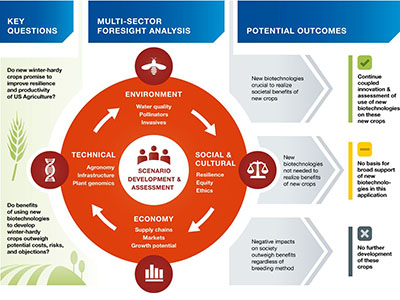
A cooperative governance network for crop genome editing
The success of governance networks in other areas could help to find common ground for applying genome editing in agriculture
Cite as:
Jordan, N. R., Dorn, K. M., Smith, T. M., Wolf, K. E., Ewing, P. M., Fernandez, A. L., Runck, B. C., Williams, A., Lu, Y. and Kuzma, J. (2017), A cooperative governance network for crop genome editing. EMBO rep, e201744394. doi:10.15252/embr.201744394.

Figure 1. Example of deliberative scenario‐based foresight analysis applied to winter‐hardy crops for development via genome editing
In this article, published by EMBOpress, researchers look at how new genetic-engineering (GE) technologies based on gene editing can help to generate crop varieties to address critical challenges in agricultural development. However, governance systems for these crops are poorly defined and currently uncertain.
A cooperative governance network for crop genome editing, co-authored by GES Center’s Dr. Jennifer Kuzma (publications), introduces a new model for cooperative governance, in which non-profit organizations, researchers, governmental agencies, and other key stakeholders work together to manage complex issues related to gene edited crops and include broad-based social and environmental assessments.
The model is based upon previous sustainability governance networks, such as those for sustainable forest products. The article recommends that cooperative governance be tested on the least intrusive and controversial applications of genome editing – those that result in single point mutations and involve crops that add to ecological and economic diversity.
Abstract:
 The application of genome editing for crop improvement has been lagging mainly owing to public debate about and continued activism against genetically modified crops. Cooperative Governance networks could be way out of the conundrum to enable safe and acceptable use of genome editing in agriculture.
The application of genome editing for crop improvement has been lagging mainly owing to public debate about and continued activism against genetically modified crops. Cooperative Governance networks could be way out of the conundrum to enable safe and acceptable use of genome editing in agriculture.
Download PDF
